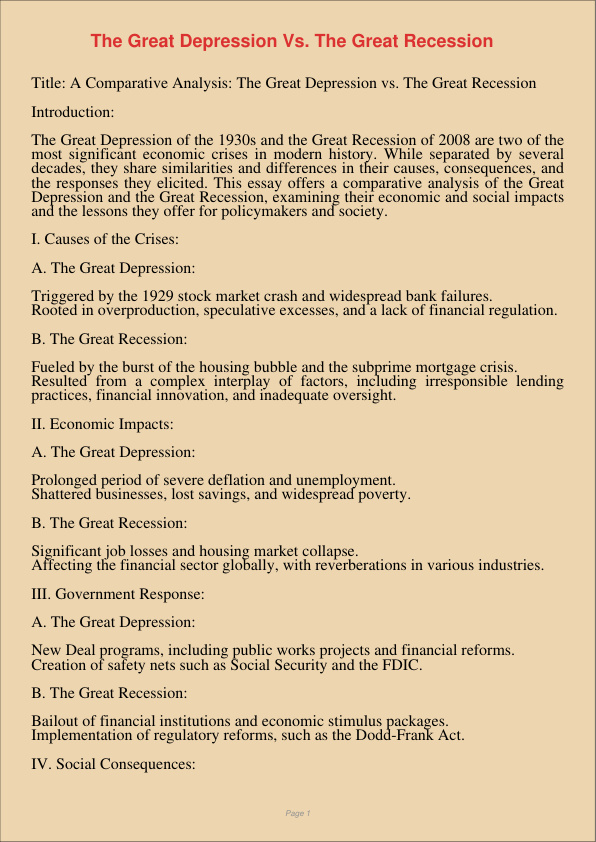
Title: A Comparative Analysis: The Great Depression vs. The Great Recession
Introduction:
The Great Depression of the 1930s and the Great Recession of 2008 are two of the most significant economic crises in modern history. While separated by several decades, they share similarities and differences in their causes, consequences, and the responses they elicited. This essay offers a comparative analysis of the Great Depression and the Great Recession, examining their economic and social impacts and the lessons they offer for policymakers and society.
I. Causes of the Crises:
A. The Great Depression:
Triggered by the 1929 stock market crash and widespread bank failures. Rooted in overproduction, speculative excesses, and a lack of financial regulation.
B. The Great Recession:
Fueled by the burst of the housing bubble and the subprime mortgage crisis. Resulted from a complex interplay of factors, including irresponsible lending practices, financial innovation, and inadequate oversight.
II. Economic Impacts:
A. The Great Depression:
Prolonged period of severe deflation and unemployment. Shattered businesses, lost savings, and widespread poverty.
B. The Great Recession:
Significant job losses and housing market collapse. Affecting the financial sector globally, with reverberations in various industries.
III. Government Response:
A. The Great Depression:
New Deal programs, including public works projects and financial reforms. Creation of safety nets such as Social Security and the FDIC.
B. The Great Recession:
Bailout of financial institutions and economic stimulus packages. Implementation of regulatory reforms, such as the Dodd-Frank Act.
IV. Social Consequences:
A. The Great Depression:
Drastic social inequality and widespread suffering. Migration and displacement of families in search of work.
B. The Great Recession:
Increased income inequality and a decline in homeownership. Challenges for younger generations entering the job market.
V. Global Impact:
A. The Great Depression:
Triggered economic difficulties worldwide, with trade declines and global repercussions. Fueled political turmoil and contributed to the rise of totalitarian regimes.
B. The Great Recession:
Had a global reach with interconnected financial markets. Demonstrated the importance of international cooperation to mitigate economic crises.
VI. Lessons Learned:
A. Economic Stewardship:
Both crises underscore the need for responsible financial and economic management, as well as vigilant regulatory oversight.
B. Social Safety Nets:
The importance of social safety nets and government intervention to prevent widespread suffering during economic downturns.
C. Interconnectedness:
The recognition of global financial interconnectedness and the need for coordinated international responses to crises.
Conclusion:
The Great Depression and the Great Recession, though separated by decades, share similarities in terms of their root causes and economic devastation. They also differ in their complexity and the subsequent responses they generated. Understanding the parallels and distinctions between these two crises is essential for policymakers and society to better navigate future economic challenges. By drawing lessons from history, we can work towards a more stable and equitable economic future, aiming to prevent the recurrence of such catastrophic events.
「真诚赞赏,手留余香」
真诚赞赏,手留余香
使用微信扫描二维码完成支付
